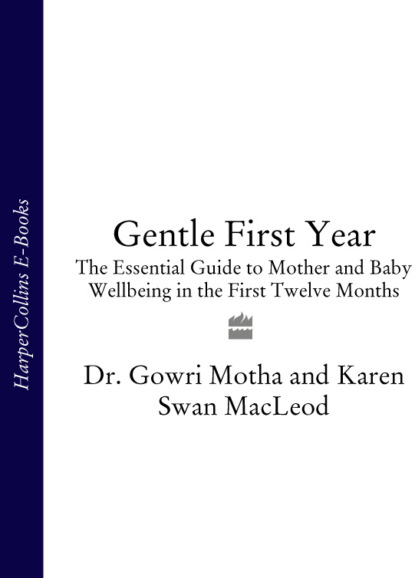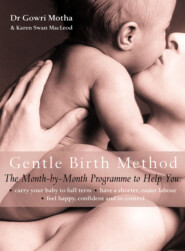По всем вопросам обращайтесь на: info@litportal.ru
(©) 2003-2025.
✖
Gentle First Year: The Essential Guide to Mother and Baby Wellbeing in the First Twelve Months
Автор
Год написания книги
2018
Настройки чтения
Размер шрифта
Высота строк
Поля
and Floradix (a natural iron supplement) to help build up your haemoglobin levels. This will counteract the effects of any significant blood loss during the birth. Anaemia can cause tiredness, anxiety and dizzy spells. Take 500mg vitamin C daily. This is important for the cell membranes and will speed healing in all your tissues after birth.
Massage. In India, it is traditional to massage the mother from the day of the birth using Ayurvedic oils. As is the custom, the pregnant mother goes to live with her mother and gives birth in her childhood home. Then her mother or aunt will massage her daily with warm coconut or cured sesame oil. The more aware women use Ayurvedic oils. I adapt this for Western cultures by advocating a rose otto oil massage (see rose otto oil self-massage). This will help lift your mood and banish the baby blues. Repeat daily if possible.
Ayurvedic herbs. Baladi choornam tones up the uterus as it involutes (the same herb I prescribe in my first book, The Gentle Birth Method). It is also a strengthening herb. Take once a day after your evening meal for a total of forty days postnatally (see Resources for details). The following Ayurvedic elixirs taste like sweet sherry:
Jeerarishtam helps to bring in your milk: the main ingredient is cumin. (See recipe in Recipe for Fennel Tonic for substitute fennel tonic.)
Dashamoolarishtam tightens the pelvic ligaments and tones the uterus.
Dhanwantaram kashayam tastes like bitters and is also prescribed for postnatal recovery of the tissues.
Visualizations. From the first day, practise daily, short visualizations of your uterus involuting and shrinking back into the pelvis – imagine it becoming small, round and tight, like a tennis ball. You may well feel afterpains. This is due to the fact that suckling stimulates the release of oxytocin, the hormone responsible for the womb contracting. This helps your uterus involute and return to its pre-pregnant size. So please practise these visualizations during feed times and whenever you have a moment when you can sit down, close your eyes and relax!
Take a shower. Preferably take a shower in the hospital. If you have been sent home within the first twenty-four hours, then you could have a shower or short bath at home. Beware: too hot a bath may cause you to have heavier lochia (vaginal bleeding). There is always some degree of bruising in the vagina, so avoid prolonged baths within the first twenty-four hours as bruised tissue is more susceptible to absorbing water, swelling up and getting infected.
Healing waters. After day two, run a bath of warm water (about 36 degrees centigrade) and add a herbal infusion made up of dried marjoram flowers, comfrey leaves and St John’s wort leaves and flowers (see Resources for stockists). Wrap up a handful of each of these three herbs in a muslin cloth and let this bundle steep in a litre of boiling water for twenty minutes. Then decant and pour into your normal bath water. It smells bitter and looks dark brown, but it will relax you profoundly, ease all your muscles and heal your perineum really quickly. If you prefer, you can infuse some camomile tea bags in a teapot and pour the lot – including the teabags – into the bath. Birth utilizes a lot of nervous energy, and camomile is renowned for its soothing effect on the nervous system. It is also very good for repairing damaged local tissues.
Drink two litres of water a day. This will encourage milk production.
Add lemon or cranberry juice to your drinking water. This will alkalinize your urine, helping to prevent cystitis, which is very common in the first few days after birth.
Toilet trips. You will find you are going to the toilet a lot. This is because your body is shedding up to five litres of extra fluid from your blood volume that was required during the pregnancy.
Light reflexology. From day one, ask your partner to massage your feet, working especially on the tops of the feet where the tendons are. This pertains to the breast reflexes and encourages good milk let-down.
Take Lactors. This is a homeopathic remedy I source from a 96-year-old homeopath in India. It helps create better quality milk that can calm irritable babies. Available to order from our website www.gentlebirthmethod.com (see Resources for details).
Feeding. Feed yourself and your baby on demand!
Diet. Be vigilant in following a low-fibre diet but with the addition of gentle greens like steamed runner beans and okra for the first few weeks, to protect from constipation. The strain of pushing when constipated can cause pressure on fresh episiotomy or Caesarean scars. Prunes and figs and cooked beetroot can really help in loosening your bowels to help you eliminate easily. You may have been prescribed lactulose by your doctor but this can only do so much – make diet your main priority. Remember the fish soup for non-vegetarians and other calcium-rich foods. For both vegetarians and non-vegetarians, pear compote and my favourite postnatal pudding, kallie, provide additional sources of natural calcium (see recipe Recipe for Raagi Kallie).
Вы ознакомились с фрагментом книги.
Приобретайте полный текст книги у нашего партнера:
Приобретайте полный текст книги у нашего партнера:






